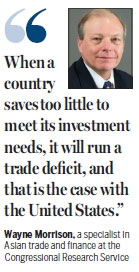Economists warn that turning trade into a zero-sum balance is too simple-minded
US economists believe that blaming other countries for US trade deficits is wrongheaded.
In an interview with the Financial Times, US Commerce Secretary Wilbur Ross dismissed the accusation of US protectionism. The 79-year-old billionaire instead cited the US trade deficit as a sign of its openness and blamed other countries for causing the deficits.
His words came after recent remarks by International Monetary Fund Managing Director Christine Lagarde and others, which included veiled concern and criticism of rising protectionism in US President Donald Trump's administration.

The G20 finance ministers and central bank governors meeting held in Germany last month also failed to include any language rejecting protectionism, as the group has done in the past, largely due to pressure from US Treasury Secretary Steven Mnuchin.
"We are the least protectionist of the major areas," Ross told the Financial Times in an interview published on Sunday. "We are far less protectionist than Europe. We are far less protectionist than Japan. We are far less protectionist than China.
"We also have trade deficits with all three of those places. So they talk free trade. But in fact what they practice is protectionism. And every time we do anything to defend ourselves, even against the puny obligations that they have, they call that protectionism," Ross said.
Wayne Morrison, a specialist in Asian trade and finance at the Congressional Research Service, said Ross and others in the Trump administration may see themselves not being "protectionist" but rather as seeking to level the playing field for US firms and workers.
He said the biggest problem with their argument is that they ignore fundamental economic theory, such as attributing bilateral trade imbalances to trade and investment barriers and implying that exports are good while imports are bad.
"Economists hold that a nation's overall trade balance is largely caused by macroeconomic forces, primarily the amount of domestic savings relative to its investment needs. When a country saves too little to meet its investment needs, it will run a trade deficit, and that is the case with the United States," Morrison told China Daily on Monday.
He said the Trump administration's focus on "bilateral trade deficits" is disturbing to some because resulting trade policies may seek only to reduce those deficits or may use a rising or falling deficit to measure the "success or failure" of their policies.
Morrison cited a scenario of the US imposing large tariffs on imported Chinese toys. As a result, US toy imports from China would likely fall, and foreign manufacturers might then move their production to other low-cost countries such as Vietnam. Ultimately the US trade deficit with China could fall, but the US trade deficit with Vietnam would rise.
"And the size of the overall US trade deficit would likely remain unchanged," Morrison said, adding that US consumers would probably end up paying higher prices for toys.
Joseph Gagnon, a senior fellow at the Peterson Institute for International Economics, also criticized the Trump administration's focus on trade deficits as a wrong approach.
In an article posted on the institute's website on April 7, Gagnon said economists broadly agree that trade barriers do not cause trade deficits. "A country can have a trade deficit only if it is borrowing on net from the rest of the world," he said.
His comments came after Trump on March 31 ordered a study of the causes of the US trade deficit, a study that will focus on trade barriers and unfair trade practices in foreign countries.
Gagnon, a former official at the US Federal Reserve Board and US Treasury, said it is important to stipulate that trade is not a zero-sum game in which imports are losses and exports are wins. "Reducing the trade deficit by reducing overall trade would throw the baby out with the bath water," he said.
chenweihua@chinadailyusa.com
(China Daily USA?04/18/2017 page2)
